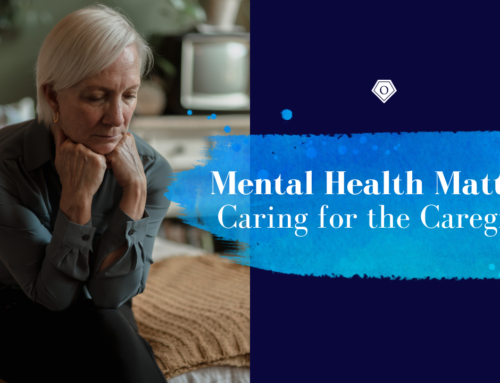We cannot give from an empty cup. We know that the first rule on a plane is to put your oxygen mask on first, before assisting others. Only when we help ourselves first can we properly support others.
Caring for yourself is equally as important as the care that you provide for your loved one. Caregiving has serious physical and emotional effects. Older caregivers are not the only ones who put their health at risk. Many baby boomers have to balance the care of an elderly loved one with the raising adolescents. All caregivers are at risk for depression, chronic illness, and a decline in quality of life.
All too often, caregivers do not enlist the help they need, placing themselves and their loved one at risk. Depression and feelings of inadequacy are common for long-term caregivers.
Caregiving is an emotional roller-coaster. It is important to identify personal needs and create a plan for success.
- Remember the big three
- Eat Right: Good nutrition can reduce stress and give you energy.
- Exercise: Even a walk around the block can release endorphins that fight depression. Exercise also helps you sleep deeper.
- Sleep: 7-8 hours
- You cannot be perfect
- You have a right to your emotions
- Depression is common for long-term caregivers
- Set realistic expectations for yourself (and your loved one)
- Learn about the illness and what to expect
- Learn what skill you can and cannot perform for the receiver
- Learn to say “no” to things you cannot do
- Learn to accept help from others
- Identify what pushes your buttons and stresses you out
- Identify your coping skills
You cannot stop the impact of a chronic or progressive illness or debilitating injury on the person for whom you care. You can take responsibility for self-care and enlisting help.
It takes different skills to care for someone over a long period. Home care offers family caregivers with the support necessary to achieve life balance and help the person in care thrive.
Caregiving.org offers a wonderful checklist for seeking solutions:
- Identify the problem. Look at the situation with an open mind. The real problem might not be what first comes to mind. For example, you think that the problem is simply that you are tired all the time when the more basic difficulty is your belief that “no one can care for John like I can.” The problem? Thinking that you have to do everything yourself.
- List possible solutions. One idea is to try a different perspective: “Even though someone else provides help to John in a different way than I do, it can be just as good.” Ask a friend to help. Call Family Caregiver Alliance or the Eldercare Locator (see Resources list) and ask about agencies in your area that could help provide care.
- Select one solution from the list. Then try it!
- Evaluate the results. Ask yourself how well your choice worked.
- Try a second solution. If your first idea didnʼt work, select another. But donʼt give up on the first; sometimes an idea needs fine-tuning.
- Use other resources. Ask friends, family members, and professionals for suggestions.
- If nothing seems to help, except that the problem may not be solvable now. You can revisit it at another time.
Too often we jump from 1 to 7. Pause when this happens and try to work through each step.
Keep an open mind and ask for support.
You are not alone.






